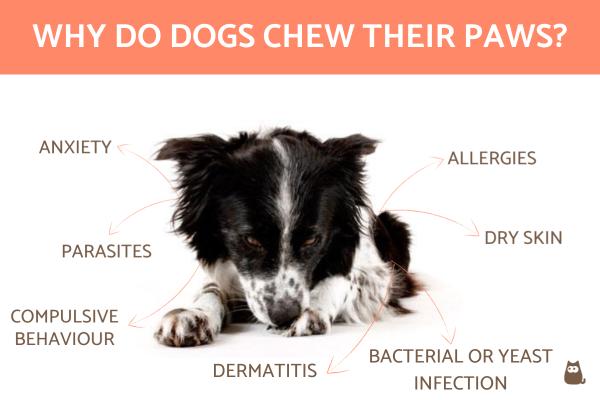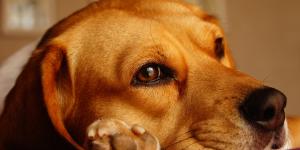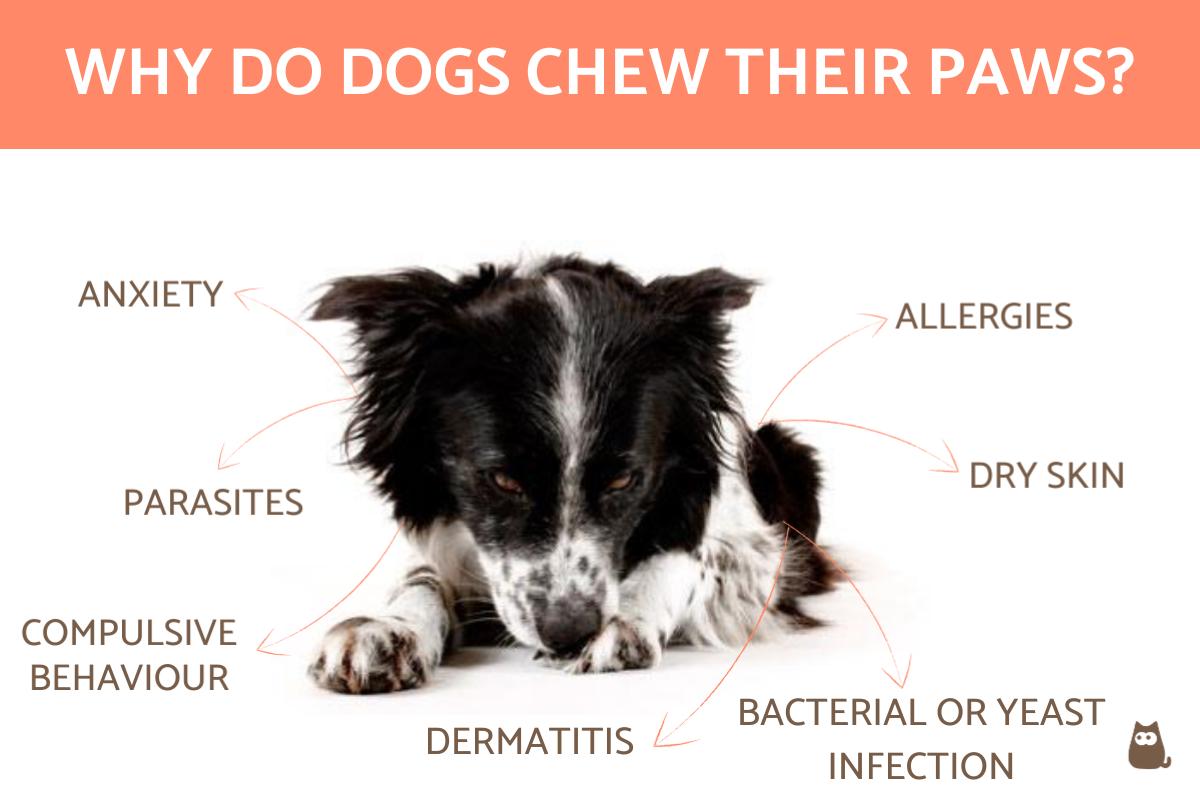Why Do Dogs Chew Their Paws?



See files for Dogs
It is not uncommon for a dog to occasionally chew or lick their paws, as this is a normal part of their self-grooming process. You may notice your dog chewing or licking their paws after being outside, especially if they have been in dirty or sandy areas. However, if your dog is compulsively and constantly chewing on their paws, it can be a sign of a more serious underlying cause. In some extreme cases, your dog may even chew the paws raw until you can see the skin or even the flesh.
The following AnimalWised article explains why dogs chew on their paws and how you can prevent it.
Why do dogs chew on their paws?
If our dog is chewing their paws incessantly, the first thing we should do is carefully examine the area.
Because the paws are constantly in contact with the ground, it is common for wounds or scratches to occur here, or for small objects such as thorns or splinters to get stuck between the fingers. If you have recently taken your dog for a walk and notice that they bite their paws shortly after, they have probably stepped on something that is causing irritation. Normally, dogs chew the area between their fingers, especially on their front legs.
If it is a superficial wound, we can always disinfect it and treat it at home. In case of a trapped object in the paws, you can try to remove it with tweezers. However, you should do this only if the object is clearly visible and can be easily removed. If you do not succeed in removing the object, or if you notice that your dog is in pain, you should consult a veterinarian.
You should also see a veterinarian if paw chewing is a new and persistent problem and if you see that the paw is red or inflamed.
Keep in mind that there are other causes that could explain the intense chewing on your dog's paws. These causes can be physical or psychological. In the following sections, we will explain these two scenarios in more detail.
You can learn more about how to treat a dog's wound at home by reading the following article on first aid for wounds in dogs.

Physical causes for dogs chewing their paws
If your dog has been chewing intensely for several days, and you have ruled out wounds or objects stuck in their paws, you should consider other physical causes. Most of these other causes require specific veterinary treatment, therefore it is advisable to take your dog to the veterinary. It is crucial to address the problem early, otherwise the dog is likely to get sores from excessive chewing, which can become infected.
The most common physical causes of your dog chewing on their paws include:
- Allergies: just like humans, dogs can have allergic reactions that can cause itching. In this case, you may also notice redness around the eyes and nose, and itching in other areas such as the muzzle, ears, and belly. It can be difficult to manage this allergy because it is not always easy to identify the triggering allergen. In any case, treatment should focus on relieving symptoms and use antihistamines, anti-inflammatory agents and even immunotherapy.
- Parasites:one of the most common causes of excessive licking or chewing in dogs is the presence of parasites. These include fleas, ticks, and mites. Parasites are not always visible, as in the case of fleas.
- Bacterial or yeast infection: biting and chewing on paws can sometimes be a sign of a bacterial or yeast infection. Depending on the severity of the infection, your dog may need an antibacterial paw treatment, antibiotic ointment or oral medication to treat it.
- Pododermatitis: consists of inflammation of the skin of the paw. Tissues affected include the interdigital spaces, pads of the feet, nail folds and nails. One or more paws may be affected. It is most commonly caused by blows, injuries, irritations, allergies, parasites, systemic diseases, cysts between the toes, or psychological problems. The veterinarian must determine the cause to determine the appropriate treatment.
- Interdigital furuncles: often referred to as cysts, interdigital furuncles are deep pyoderma lesions that form between the toes of dogs. They look like a lump, and in some cases they open and release a purulent content. They are usually caused by an injury, such as a blow, a foreign object or a bite. Treatment consists of prolonged administration of antibiotics to avoid infections.
- Dry skin: this is more common in the fall or winter. Dry skin in dogs can also be due to a lack of fatty acids. This causes the dog to feel uncomfortable and start licking or chewing his paws excessively.
Continue reading this other article if you want to learn more about allergies in dogs and how to treat them with alternative treatments like homeopathy.

Psychological causes for dogs chewing their paws
It is important to keep in mind that compulsive chewing can be due to a psychological problem. Dogs can suffer from stress and anxiety, just like humans.
Biting and chewing on paws can be a compulsive behavior problem and a sign that your dog is suffering from chronic anxiety symptoms. Dogs that are confined for long hours, receive little attention, are very nervous, are tethered, bored, etc., can develop stereotypic behaviors that include compulsive paw chewing. Dogs may start biting their paws to relieve their stress or excess energy.
Other signs to watch for include ears laid back, tail tucked, hackles up, licking lips, yawning and panting. Your dog might also avoid eye contact or look away.
In some cases, especially before leaving the house, you may also notice that your dog is getting restless, pacing back and forth or whining and generally seeming upset. If this is the case, the paw chewing could be a reaction to another underlying problem, such as separation anxiety.
Proper treatment of your dog's anxiety is critical to relieving their overall symptoms. Behavioral training and medication are two of the most common forms of treatment.
Continue reading this other article to learn the 10 most common signs that your dog is stressed.

Tips for preventing your dog from chewing on their paws
To help your dog break the habit of chewing on their paws, take them to a veterinarian for a professional examination. A veterinarian can determine the best treatment method for your dog's particular situation, depending on the cause.
However, there are some things you can do to minimize the possibility of your dog developing this habit in the future. These include:
- Follow your dog's deworming program closely. If your dog spends a lot of time outdoors or participates in activities that could increase the risk of parasite infection, you should increase the frequency of deworming.
- Thoroughly examine your dog's paws after walking in wooded or sandy terrain.
- Include essential fatty acids from fish oils in your dog's diet, as they have a positive effect on the skin.
- Use special shampoos for dogs with sensitive skin or coats to avoid adverse reactions.
- Socialize your dog from puppyhood, so they are less likely to develop behavior problems such as separation anxiety.
You can learn more about other ways to treat compulsive paw chewing by reading this other article on how to stop your dog from paw chewing.

This article is purely informative. AnimalWised does not have the authority to prescribe any veterinary treatment or create a diagnosis. We invite you to take your pet to the veterinarian if they are suffering from any condition or pain.
If you want to read similar articles to Why Do Dogs Chew Their Paws?, we recommend you visit our Other health problems category.
- Carlson and Giffin. (2002). Practical manual of canine veterinary medicine . Madrid. Publishing the Drac.









